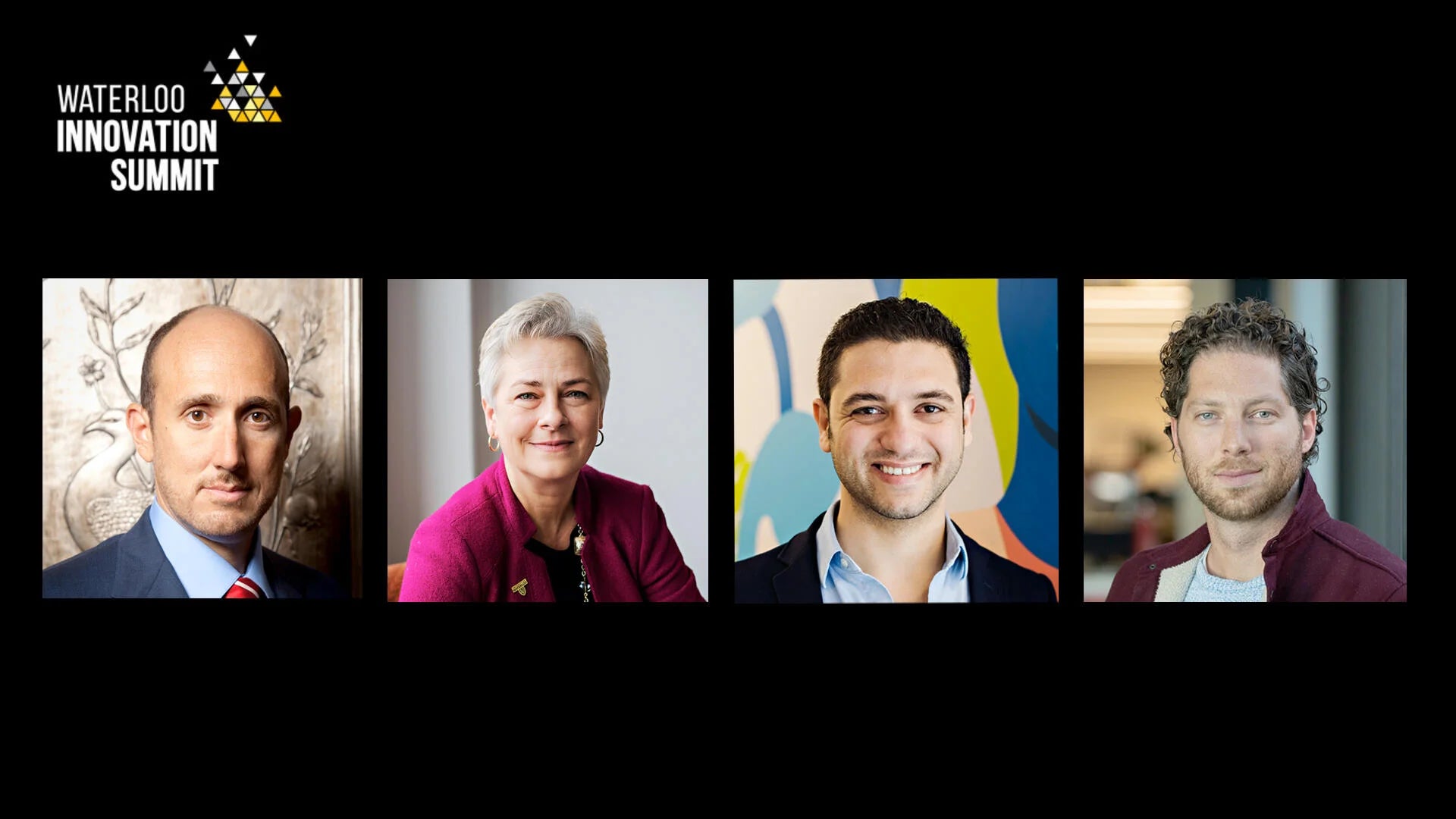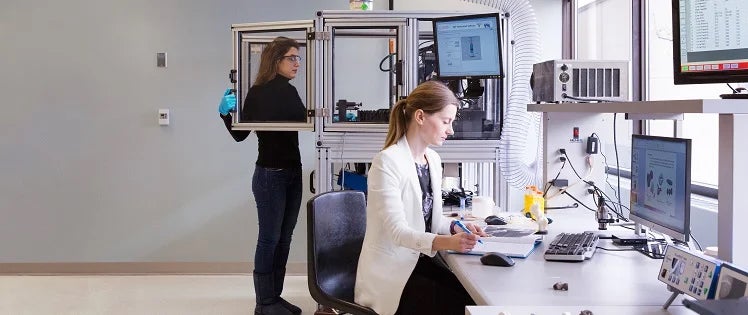Editor:
Brandon Sweet
University Communications
bulletin@uwaterloo.ca
COVID accelerates the need for a resilient and adaptable workforce

Featured Waterloo Innovation Summit speakers Randall Lane, Norah McRae, Martin Basiri, and Michael Litt.
By Angelica Sanchez. This is an excerpt of an article originally published on Waterloo Stories.
The COVID-19 pandemic has forced industries to re-evaluate and transform their purpose. Canada and the world need a resilient and future-ready workforce to help drive our economic recovery.
During Waterloo’s first virtual Innovation Summit, industry leaders explored how attracting and retaining highly-skilled talent has quickly become a top priority across organizations in all sectors.
“Waterloo is on the leading edge of developing career-ready, talented graduates — the next generation of driven, ambitious and inquisitive employees,” said Charmaine Dean, vice-president of research and international at the University of Waterloo. “They will make up the resilient and adaptable workforce that is really needed in this era of accelerated change.”
Here are three insights from Waterloo’s Innovation Summit on how future talent and the digital revolution will accelerate global change as we look to reset, rebuilt and rebound our post-COVID world.
Breaking down barriers
“We are in the most transformative, economic moment since World War II,” began Randall Lane, chief content officer and editor at Forbes Magazine and keynote speaker at Waterloo’s Innovation Summit. “[Virtual] gatherings like this have never been more essential.”
Adopting words from Niccolo Machiavelli, Winston Churchill and Rahm Emanuel, Lane encouraged listeners to “never waste a good crisis,” emphasizing that the importance of tapping into today’s technology and talent to break down previous workplace barriers.
“What excites me is that people can now be pretty much anywhere they want,” Lane said. “We’ve made many hires in the past few months, almost none of them have been in New York because we’re realizing it’s not as necessary to be at the home office. And so what that does is actually takes the pressure off any region to have to hone only its business ecosystem … it really makes it holistic, where if it’s a place where people want to live, it’s [also] now a place that people can work.”
Anticipating this shift in the workplace, Forbes created a list outlining five major trends that are needed during these constantly changing times:
- Treat and pay workers with respect
- Having a purpose matters
- Talent starts with education
- Unlocking talent with fairness create opportunities for all of us
- Collaboration is key
Increasingly, we’re seeing that being good to people is good for business, Lane said.
Lane explained how the future of talent is becoming a top priority for organizations as universities prepare students to adopt new trends and digital skills that employers need to succeed in different industries.
Tech is a constant and a commodity, while people are the value-added
The rate at which organizations have adopted digital technologies is accelerating dramatically. From spikes in e-commerce, to the digital applications that make working remotely happen — companies have redefined their objectives to be more adaptable.
“The longer we are in this state of working remote … the more it shows that we as a society can be economically productive in this world, the more permanent this is ultimately going to be,” Michael Litt (BASc ’11), co-founder and CEO of Vidyard, said.
Looking toward the upcoming generations of talent, Litt applauded universities like the Waterloo who are embedding digital practices of video into their everyday, remote working environments to maintain a higher connection with colleagues. Companies must ensure that employees feel included — digital innovations can help build that bridge.
“if you don’t use video during a Zoom call or you’re not using Slack’s calling feature, or you’re not using asynchronous communications, ultimately, you’re not able to be productive. And frankly, as a business owner, the impact to [operation expenditures] is phenomenal.”
Read the rest of the article on Waterloo Stories
New process for graduate studies practica and internships

A message from Graduate Studies and Postdoctoral Affairs (GSPA).
Over the past few months, Graduate Studies and Postdoctoral Affairs (GSPA) has been working with campus stakeholders, including Faculty Associate Deans, Graduate Studies, Faculty Deans and the Safety Office, to support graduate programs and students that have had scheduled internships or practica precluded or delayed by COVID-19.
As a result of the consultation and work, we have developed a process by which programs or students can seek approval for in person activity at a placement. Details of the new process can be found on the GSPA Practica and Internships web page.
Q and A with the experts: managing natural disasters during COVID-19
The University of Waterloo has a number of experts available for comment on various aspects of the COVID-19 pandemic.

As hurricane season is now upon North America, we have many questions about the particular challenges of managing disasters during COVID-19. How do governments evacuate people safely? How will already scare PPE supplies be tested?
We spoke to Professor Jason Thistlethwaite, an expert in strategies to reduce the economic impacts of extreme weather and climate change, to hear his thoughts about managing disasters alongside the pandemic.
How does COVID-19 add to the difficulty of managing a natural disaster like a hurricane?
COVID-19 limits our ability to evacuate by grouping people in spaces we traditionally use for shelter such as community centres, convention centres, schools and sports facilities. Similarly, many families often seek shelter with relatives in other jurisdictions which could increase the spread of COVID-19.
COVID-19 also disproportionately affects those who are socio-economically vulnerable or marginalized. Hurricanes increase that burden since unemployment is higher in these communities. Many are unable to financially support their own recovery, can’t take time off work to help clean or re-build, and may subsequently forfeit mortgage payments.
Lastly, local governments have lost billions in revenue due to COVID-19 and are unlikely to have the financial and human resources to help prepare and recover from a hurricane.
Are there steps that can be taken in advance of a storm/event to ensure that we don’t increase the risk of transmitting COVID-19 in the aftermath?
Professional disaster response organizations, such as the military or Red Cross, as well as health clinics and hospitals, that have resources to protect communities from hurricanes as well as protect themselves from COVID via PPE, should be mobilized and ready for deployment. We should not be relying on volunteers who have less ability to protect themselves from COVID.
Hotels are mostly empty right now and should be identified beforehand as potential evacuation sites with PPE made available on site. Separate rooms for families can help limit the spread of COVID transmission compared to the large open spaces in community centres, schools or sports facilities. Ideally, COVID testing would be made available at any key evacuation sites.
If evacuation is not possible for some, emergency responders should deliver and distribute food and essential items to communities predicted to be in the path of the hurricane to avoid long lines and crowding at stores.
What can governments do to mitigate the spread of COVID-19 during a natural disaster?
Governments should ensure PPE distribution plans are prepared and freely available for evacuees and emergency responders. It is going to be hard to avoid groupings of people in an evacuation or rescue centres, so make sure PPE is made available at locations where most people have access.
Ensure a clear command structure is established between emergency responders and public health authorities.
Jason Thistlethwaite is a Professor for the School of Environment, Enterprise and Development. His research focuses on innovative strategies designed to reduce the economic impacts of extreme weather and climate change. He explores the role of insurance and government risk-transfer in promoting climate change adaptation and reducing economic vulnerability.
Link of the day
Cat lovers, this is the moment you've been training your whole lives for
When and Where to get support
Students can visit the Student Success Office online for supports including academic development, international student resources, leadership development, exchange and study abroad, and opportunities to get involved.
Instructors can visit the Keep Learning website to get support on adapting their teaching and learning plans for an online environment. The following workshops are current offerings from the KL team (CTE, CEL, ITMS, LIB):
Getting Ready to Facilitate Online Courses: TA Training, beginning July 13.
Akindi Training Session, Wednesday, July 22, 1:00 p.m.
NEW - Active Learning Online Part 2, Thursday, July 23, 1:00 p.m.
NEW - Introduction to PebblePlus, Monday, July 27, 1:00 p.m.
NEW - Assessment Design Cafe, Tuesday, July 28, 10:30 a.m.
Employees can access resources to help them work remotely, including managing University records and privacy of personal information
Interested in learning more about engaging your students in an online course? The Centre for Extended Learning has created a new resource for you called "Fostering Engagement: Facilitating Online Courses in Higher Education"
ThisOpen Educational Resource was designed for post-secondary instructors and teaching assistants who would like to better understand the critical role of facilitation in online course delivery, and build practical skills and strategies that are relevant, effective, and authentic.
Here are some tips for staying healthy while working from home.
The Writing and Communication Centre has gone virtual. We have many online services to help you meet your goals, including: Virtual Pre-booked and Drop-in appointments, Online workshops, Virtual Grad and Faculty Writing Cafés, Instagram Live Q&A sessions, Live PJ-Friendly Write-ins, Online learning resources, and Online programming for Master’s and PhD students. Whatever you’re working on, we’re here to help! Visit our website for more information.
We understand that these circumstances can be troubling, and you may need to speak with someone for emotional support. Good2Talk is a post-secondary student helpline based in Ontario, Canada that is available to all students.
If you feel overwhelmed or anxious and need to talk to somebody, please contact the University’s Campus Wellness services, either Health Services or Counselling Services. You can also contact the University's Centre for Mental Health Research and Treatment.
The Library has published a resource guide on how to avoid information overload.
The Faculty Association of the University of Waterloo (FAUW) continues to advocate for its members. Check out the FAUW blog for more information.
The University of Waterloo Staff Association (UWSA) continues to advocate for its members. Check out the UWSA blog for more information.
WUSA supports for students:
Food Support Service food hampers are currently available from the Turnkey Desk on weekdays from 9:00 a.m. to 4:00 p.m. in the Student Life Centre. If you have any questions please email us at foodsupport@wusa.ca.
MATES – Providing general online Peer Support via Skype to undergraduate students. To set up an appointment, please go to: https://wusa.ca/peersupport
Glow Centre - Providing online Peer Support for the LGBTQ2+ community via Skype to Undergraduate students. To set up an appointment, please go to: https://wusa.ca/peersupport
The Women’s Centre– Providing online Peer Support via Skype to undergraduate students. To set up an appointment, please go to: https://wusa.ca/peersupport
RAISE– Providing online Peer Support via Google to undergraduate students. To set up an appointment, please go to: https://wusa.ca/peersupport
The Bike Centre – Now open by appointment for your bicycle repair and rental needs in the Student Life Centre. For more information or to schedule an appointment, please go to: https://wusa.ca/bikecentre
Centre for Academic Policy Support - CAPS is here to assist Waterloo undergraduates throughout their experience in navigating academic policy in the instances of filing petitions, grievances and appeals. Please contact them at caps@wusa.ca. More information at http://wusa.ca/caps
WUSA Commissioners who can help in a variety of areas that students may be experiencing during this time:
- Equity – equity@wusa.ca
- Co-op and Experiential Affairs – coop.affairs@wusa.ca
WUSA Student Legal Protection Program- Seeking legal counsel can be intimidating, especially if it’s your first time facing a legal issue. The legal assistance helpline provides quick access to legal advice in any area of law, including criminal. Just call 1-833-202-4571.
Empower Me is a confidential mental health and wellness service that connects students with qualified counsellors 24/7. They can be reached at 1-844-741-6389.
When and Where (but mostly when)
Healthy Warriors at Home. Free programming including Online Fitness, Personal Training, Health Webinars, Personalized Nutrition and more. Open to students, staff, faculty and alumni. Register today.
Waterloo Warriors Online Hockey Skills Camps. Designed to provide a fun, inclusive and safe atmosphere where youth can take part in skill development and team building. Age 7-9 and 10-12. Only $50/week and includes 5 x 1 hour sessions. Register today.
Warriors Big 6 Summer Challenge. Weekly challenges from July 13 to August 23 focusing on Movement, Sleep, Hydration, Nutrition, Apps and Choose your own adventure. Post your photo and tag @WlooRec on Instagram for a chance to win a $100 box from truLOCAL each week as well as $100 from Mel’s Diner for our grand prize winner. Stay healthy Warriors!
Clarity in scientific writing, Monday, July 20, 2020, 1:00 p.m., Live Q & A on LEARN.
Say it in your own words: Paraphrase & summary for graduate students, Thursday, July 23, 9:00 a.m., Live Q & A on LEARN.
Taking Action Against Online Harassment. Learn how to communicate in virtual spaces, through text and social media, in a supportive and safe manner. Discussion includes how online violence - including sexual harassment, happens, and participants will gain tools and skills for negotiating respectful communication. Thursday, July 23, 1:00 p.m. to 2:30 p.m.
New Faculty Online Social, Thursday, July 23, 2:30 p.m.
NEW - IT Seminar: OneDrive - Storage Wars, Friday July 24, 9:00 a.m. to 9:45 a.m. Join online.
Alumni Family Day, Saturday, July 25, 10:00 a.m. to 5:00 p.m., online.
Human Rights, Equity and Inclusion seminar, Equitable Recruitment & Selection (Faculty only, offered anytime through Learn), Monday, July 27, 1:00 p.m. to 4:00 p.m.
Environment Live Chat, Wednesday, July 29, 11:00 a.m. to 12:00 p.m.
Science Innovation Hub Skills Development Workshop: Figure Making 101, Wednesday July 29, 3:00 p.m.